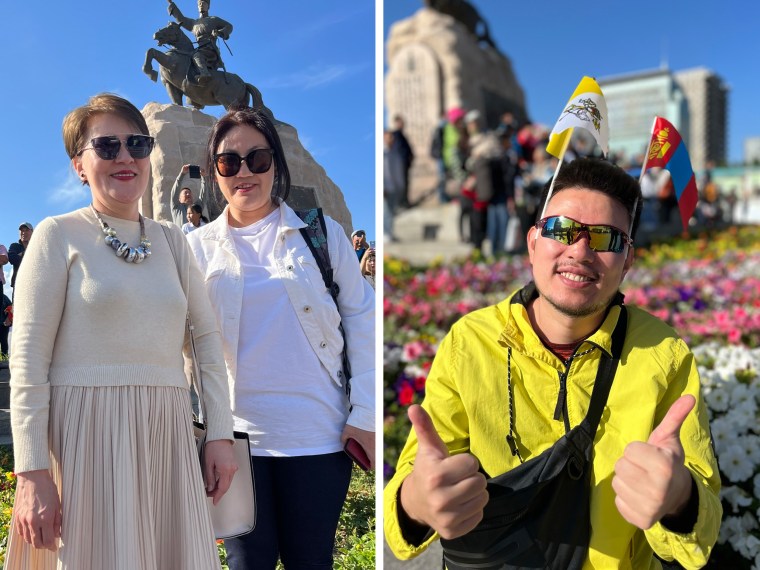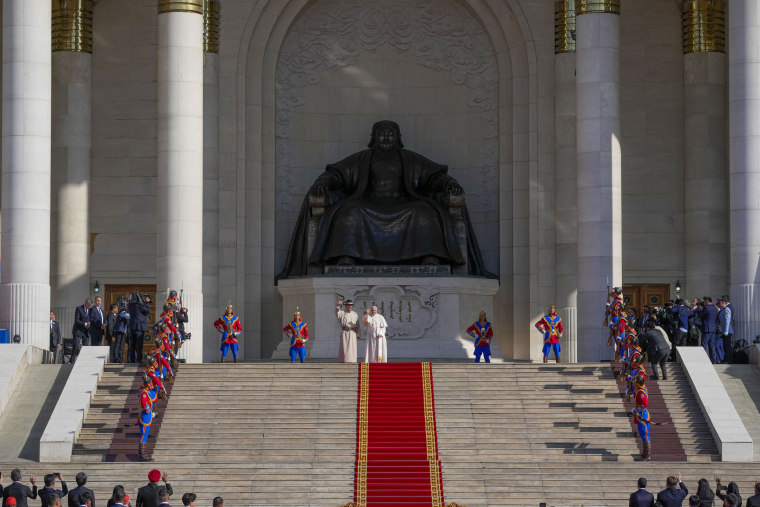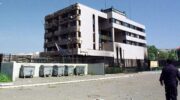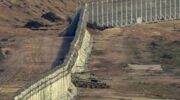ULAANBAATAR, Mongolia — Under the towering statue of 13th-century warrior Genghis Khan, Pope Francis was not greeted by hordes of people in Mongolia’s capital Ulaanbaatar on Saturday.
Rather than the throngs of thousands he’s used to, about 200 of the faithful from one of the world’s smallest and newest Catholic communities enthusiastically greeted the pontiff in the city’s central Sükhbaatar Square, where he sat with Mongolia’s President Ukhnaagiin Khürelsükh.
“Viva il Papa” the small but enthusiastic crowd chanted, some of who waved Mongolian and Vatican flags as guards dressed in traditional blue, red and yellow attire stood nearby.
“It’s a blessing, we are very happy to see him in Mongolia, we never thought he would come here,” Ming Baldorg, 33, told NBC News. “We are all surprised. We are shocked but very happy.”
Yang Guang, 37, a Chinese Catholic living in Ulaanbaatar, said he hoped Francis would visit his homeland one day. “I believe one day it will happen, we must trust the Lord,” he said.
 Ming Baldorg and her friend Enkhjarjal; Yang Guang, a Chinese Catholic living in Mongolia.Claudio Lavanga / NBC News
Ming Baldorg and her friend Enkhjarjal; Yang Guang, a Chinese Catholic living in Mongolia.Claudio Lavanga / NBC NewsLater in a speech at Ulaanbaatar’s Cathedral of Saints Peter and Paul, Francis talked about the roots of Catholicism in Mongolia, where the church has had a presence for centuries. But Catholicism was sanctioned only after the country abandoned its Soviet-allied communist government 1992. As a result, the Catholic community numbers only about 1,500 people.
“The events of the first millennium and the work of evangelization carried out by missionaries of Syriac tradition along the Silk Road were followed by a remarkable missionary outreach,” he said, before asking, “How can we fail to mention the diplomatic missions of the 13th century?”
Francis delivered his remarks to the president, diplomats and cultural leaders at the state palace, where he praised Mongolia’s tradition of religious freedom, noting that such tolerance existed both before and during the expansion of the Mongol Empire over vast swaths of the world.
“The fact that the empire could embrace such distant and varied lands over the centuries bears witness to the remarkable ability of your ancestors to acknowledge the outstanding qualities of the peoples present in its immense territory and to put those qualities at the service of a common development,” Francis said, according to The Associated Press. “This model should be valued and re-proposed in our own day,” he said.
-3r4978.jpg)
Pope Francis arrives in Mongolia to visit to one of the smallest Catholic communities in the world
Lamenting an “earth devastated by countless conflicts” and calling for a renewal of respect for international law, the pontiff also referred to “Pax Mongolica,” Latin for Mongol peace, a period of relative stability over Eurasia during the 13th and 14th centuries among those living in the Mongol Empire’s conquered territories.
While Catholicism has been legal in Mongolia since the end of Soviet rule in 1992, Francis hopes to come to a bilateral agreement with the government that would lift continuing restrictions on worshipper numbers and end the treatment of the church as a nongovernmental organization, a thorn in the side of foreign missionaries working in the region.
 Mongolian President Ukhnaagin Khurelsukh, left, and Pope Francis in Sukhbaatar Square in Ulaanbaatar, Mongolia, on Saturday.Andrew Medichini / AP
Mongolian President Ukhnaagin Khurelsukh, left, and Pope Francis in Sukhbaatar Square in Ulaanbaatar, Mongolia, on Saturday.Andrew Medichini / APIssues of religious tolerance have also marked the Vatican’s strained relationship with neighboring China, where President Xi Jinping’s demand that religions adhere to the policy of Sinicization has led to the removal of exterior crosses from church buildings in the Protestant heartland of Zhejiang, as well as the demolition of mosques and the wide-scale persecution of China’s Muslim community.
Though Francis and Xi signed an accord in 2018 to allow papal oversight in Chinese bishop appointments, China has since violated it.
The Vatican also hopes the visit might provide an opportunity for diplomacy with the Kremlin. Francis caused controversy in both Russia and Ukraine last week when he was forced to clarify a statement in which he called on young Russians to remember the history of “great mother Russia” and Peter I, after the Ukrainian Foreign Ministry called his comments “imperialist propaganda.”
Back in the Sükhbaatar Square, although he identified as an atheist, Tsolmon Bat-Erdene, 28, told NBC News that he thought the pope’s visit to Mongolia was “strategically and geopolitically important.”
“Our neighbors are Russia and China, and the pope’s visit here will affect both countries and the way they see us,” he said.
Claudio Lavanga reported from Ulaanbaatar and Leila Sackur from London.




